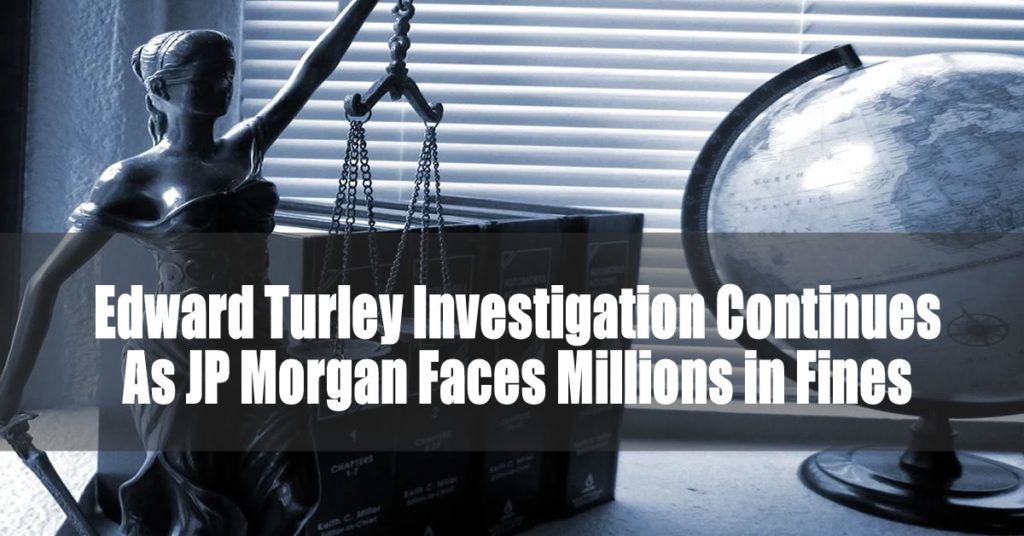Edward Turley, a former top financial advisor from JP Morgan, is under investigation by Haselkorn & Thibaut for the handling of client accounts, sales practices, and company policies. Multiple clients of Mr. Turley have alleged they were sold products that were not suitable. Both JP Morgan and Turely were required by FINRA rules to make sure all investments were properly disclosed and suitable to clients.
According to the award recently finalized by the Financial Industry Regulatory Authority (FINRA) J.P. Morgan Advisors (JPMA) has been asked to pay $4 million, the latest in a series of claims faced by the firm arising out of the Covid-19 onset induced nosedive of the market in the first half of 2020. The three public arbitrators on the panel denied all but the compensatory damage claim of the complainant.
Edward Turley clients are encouraged to call our experienced investment fraud lawyers at 1-800-856-3352 for a free consultation and portfolio review.
The complaint against Edward Turley
Table of Contents
Lacy Winston Keath, a Texas-based customer of J.P. Morgan Advisors (JPMA), filed a claim for $5 million in compensatory damages against the firm in May 2020. The total amount sought by the complainant over the course of the arbitration proceedings was $11.6 million which included expenses, treble damages, punitive damages, and attorneys’ fees plus $76,000 in expenses.
The claim was based on the broker trading in ‘unsuitable’ securities in her account without authorization. This included trading in securities that would be classified as high-risk, including ‘junk’ bonds. Additionally, the firm had increased the quantum of bets, including taking up high-risk positions in foreign currencies, by leveraging her portfolio, as per the complaint.
Edward Turley broker profile
The broker in question was Edward L. Turley, who has since been discharged by JPMA citing “[l]oss of confidence concerning adherence to firm policies and brokerage order handling requirements,” according to his BrokerCheck record, though he was not named in the claim by Keath.
A 28-year veteran of the industry, Turley had been associated with JPMA from 2009 onwards. He has not registered with another FINRA member firm since the discharge.
Before he joined JPMA, Turley worked with Lehman Brothers from 1995 to 2005 after which there was a break in his career before he restarted with JPMA. He was with Credit Suisse First Boston between 1991 and 1995 and before that, in his first job in the industry, he worked for Morgan Stanley from 1988 to 1991.
A claim for $49,000 in 1999, over alleged misrepresentation of investment products, is the only other disclosure on his record. That claim was denied.
As of August, Turley had $1.6 billion in assets he was managing, on which he had generated revenue of $30 million for the firm.
On the flip side, however, he also has claimed from 4 customers adding up to $57 million, mostly arising out of losses faced by customers in the pandemic-induced crash. These are other than the recently settled Keath case, which now forms a part of his CRD record.
Client Suitability
To ensure investor protection, promote fair dealings with customers, and ethical sales practices, suitability obligations are essential. FINRA Rule 2211 regulates general suitability obligations. However, certain securities may be covered by other rules with additional requirements. FINRA Rule 2111 is not applicable to SEA Rules 15l-1 recommendations (Regulation Best Intent). For more information about Reg BI, please visit the topic on SEC Regulation Best Interest.
FINRA Rule 2111 states that a firm or an associate must have a reasonable basis for believing that a recommended transaction or investment strategy involving securities or securities is suitable. This information is based upon the reasonable diligence of the associated person or firm to determine the customer’s investment profile.
The rule says that the customer’s investment profile includes, among other things, his age, other investments, and financial situation, tax status, tax status, investment goals, investment experience, time horizon, liquidity requirements [and] risk tolerance. The rule is activated by a broker’s recommendation, which is based upon the facts and circumstances in a specific case.
Rule 2111 states that brokers must have a solid understanding of the customer and product. This violates Rule 2111.
JPMA’s response in the case
In a response filed in July 2020, JPMA had argued against the claim and had filed a counterclaim asking for the case to be dismissed with expenses of the arbitration being assessed to Keath. According to them the transactions were legitimate as Keath, in the contract, had agreed to “indemnify Respondent under the terms of the Customer Agreement and the terms of the Durable Power of Attorney for Financial Management.”
The panel, not impressed with the argument, had adjudged $27,675 of the $29,850 in fees to be paid by JPMA.
Final words
No comment has been forthcoming from the spokesperson of JPMA on either the recent award or the pending cases. Turley has also not offered any comment on the case and the award. Investors are encourage to seek the advice of an investment fraud lawyer.


